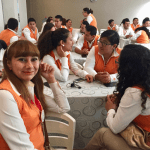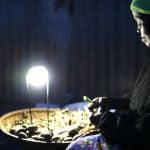Social Business Roundup: The Problem with Sachets, the Beauty of Rats and the Dark Side of Cross-Selling
Waste at the Bottom of the Pyramid
Base of the pyramid customers spend more than half of what they earn on food and beverages. Increasingly, those items are packaged in individually-sized sachets, affordably priced. That’s great for companies, even better for consumers, but increasingly bad for the environment – and it’s turning into “a major waste problem” writes Fernando Casado Cañeque and colleagues with GlobalCAD on the Practitioner Hub for Inclusive Business. The researchers consider alternatives, such as reusable or compostable packaging. (Incidentally, Kenya is about to become the 15th country to ban plastic bags). But ultimately, they push fast-moving consumer goods companies to take “responsibility for the products they sell and the (long-term) impact those products have on the BoP community.”
The noses that know
(To be read with the “Rocky” theme song playing in the background.) Twelve scrappy heroes are currently undergoing rigorous and extensive training in Tanzania, preparing for an upcoming series of death matches in Ethiopia.
OK, that might be a bit melodramatic. The heroes are just rats; African giant pouched rats, specifically. But the death matches are all too real. The dozen rodents are being trained by APOPO to sniff out tuberculosis in Addis Ababa, a TB hotbed, one sputum sample at a time.
With their keen sense of smell, the rats can check 100 samples in 20 minutes, a task that would take a lab technician four days. Seventy-six TB-sniffing rats are already earning much-deserved food rewards in labs in Tanzania and Mozambique. The program’s extension into Ethiopia, announced this week, is made possible by an $800,000 grant from the Skoll Foundation and $595,000 from the Elton John AIDS Foundation (for a case-finding study being conducted in prisons), according to Charlie Richter, APOPO US director.
The Dark Side of Cross-Selling
A troubling story is developing in South Africa: In 2011, after a problematic bidding process, the South African Social Security Agency contracted a private company, Cash Paymaster Services (CPS), to distribute social grants. The ostensible purpose was to take advantage of CPS’s ability to biometrically authenticate beneficiaries, reducing fraud. But while it’s not clear if that actually happened, something else did: CPS leveraged the database of grant recipients to cross-sell them a range of additional financial products, from airtime to microloans, through subsidiary companies – which often lured them into costly long-term commitments via SMS messages, then deducted payment automatically from their grants. The result: grave harm to an already vulnerable population, a black mark on the government – and uncomfortable questions about the value of financial inclusion and the role of development finance in the debacle.
Another Mobile Money First in Kenya
In what will (hopefully) be a more positive linkage of government and private financial interests, Kenya marked a global first this week, as the government started selling bonds to citizens exclusively via cell phone (after a two-year delay). The treasury sees the M-Akiba bond (named after the Kiswahili word for “savings”) as a way to give ordinary Kenyans access to capital markets – and generate cheap funding for government programs. Investors can buy and sell bonds as small as 3,000 shillings (about $30) on the Nairobi Securities Exchange via M-Pesa and other mobile money networks, using smartphones or feature phones.
Virtual Poverty, Real Empathy
A fascinating article in The Guardian explores how NGOs are harnessing virtual reality, which Chris Milk, founder and CEO of VR company Within calls “ultimate empathy machines.” Among the experimenters are organizations well known to the NextBillion community, including the BoP Innovation Center.
“You can follow people living in slums, how they go about their morning, what they eat for breakfast. It gives people a sense of presence,” Gerwin Jansen, social innovation programme manager at the Center told The Guardian.
Nothing can beat meeting people in person, observing how they live and doing it with humility. But VR could be the reality primer many entrepreneurs and business people desperately need before stepping off the plane.
Behind that closed door: The right man for the job
The world’s richest man is standing up for the poorest people on Earth against the planet’s most notorious politician.
That’s the strange-but-true premise of Bill Gates’ Monday meeting with U.S. President Donald Trump, concerning Trump’s proposed budget that would cut funding for many of Gates’ favorite health and development programs around the world.
Before the meeting, Gates wrote for TIME magazine that the projects are worthwhile because they ”keep Americans safe.” Neither he nor Trump talked much about it afterward. The good news for the world’s poor is that if you had to pick one guy to represent you in a debate in which facts and figures ought to matter, Gates would be that guy.
A Spending Cut That Costs Money
On the topic of budget cuts for development programs, this Bloomberg article asks a great question: “Why cut an agency that makes money?” The article comes from Daniel Mintz at Olympus Capital Asia, and the agency in question is the Overseas Private Investment Corporation (OPIC). As Mintz explains, OPIC mobilizes private capital for emerging markets, and in the process, it actually makes money for U.S. taxpayers – some $5.7 billion since it was created in 1971. Last year alone, it generated $263 million in revenue with a budget of just $63 million. Even Donald Trump would have to admit: That’s a great deal.
Two Household Names Enter India’s Mobile Payments Market
This week marked the entry of two major names into India’s increasingly crowded mobile payments market. Korean electronics giant Samsung launched Samsung Pay, beating rivals Apple Pay and Google’s Android Pay to the punch. India is the 14th global market targeted by Samsung Pay – a country that’s second only to China as a smartphone market. Meanwhile Starbucks has brought its wildly successful mobile app – one of the few mobile payments apps to gain major traction in the U.S – to India, which also happens to be its fastest-growing market.
Photo by Jeff Attaway via Flickr
- Categories
- Environment, Health Care, Social Enterprise, Technology



